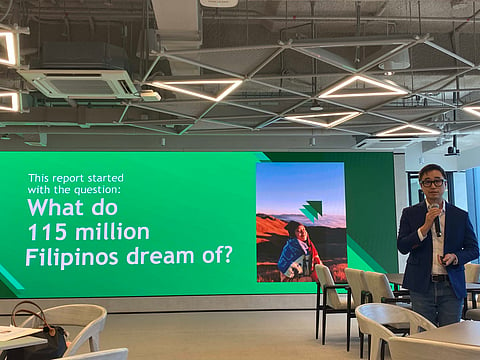
- NEWS
- the EDIT
- COMMENTARY
- BUSINESS
- LIFE
- SHOW
- ACTION
- GLOBAL GOALS
- SNAPS
- DYARYO TIRADA
- MORE

With the significant destruction caused by the COVID-19 pandemic four years ago, most Filipinos are now focused on investing in health security and starting businesses, according to a recent study by the Boston Consulting Group (BCG), revealed on Tuesday.
The survey, titled “The Filipino Dream,” was conducted during the first two weeks of October 2024 and interviewed 1,484 respondents. It identified two primary dreams that resonate most deeply with Filipinos: financial security, particularly the ability to handle healthcare emergencies, and the desire to start a business for economic stability and independence.
Julian Cua, managing director and partner of BCG, said these dreams highlight a prevailing sentiment across Filipino society—a desire for resilience, self-sufficiency, and progress that reflects the Filipino spirit.
The survey revealed that 58 percent of respondents ranked financial security for health scares as a top priority, reflecting concerns over healthcare costs and access. Meanwhile, 56 percent expressed aspirations to start their own businesses.
BCG’s analysis further revealed that while Filipinos share common values, distinct demographic segments face unique challenges in realizing their dreams. Using advanced clustering techniques, BCG identified four main segments of Filipino dreamers. These include Providers, which are working-class millennial women focused on family stability; Trailblazers, which are younger, single Gen Zs aiming for personal growth and financial independence; Guardians, which are older Filipinos, mostly from rural areas, seeking stability for retirement; and Rebuilders, which are millennials with diverse backgrounds looking to bounce back financially after setbacks, particularly post-pandemic.
“We think the findings of our study will surprise many people,” Cua said. “But we believe it presents a clear picture of the barriers Filipinos face and their resilience in overcoming them. By understanding the dreams of different Filipinos and their motivations, we believe corporations in the Philippines will be able to better support and empower them at every stage of their journey.”
Optimism, ongoing obstacles
Despite a shared resilience, the survey also revealed significant obstacles. Fifty-three percent of respondents feel closer to achieving their primary dream than last year, and 68 percent are optimistic about the coming year.
While optimism remains strong—particularly among rural consumers—significant challenges exist.
Four of the top six dreams in the survey relate to financial security, underscoring that rising living costs, healthcare expenses, and institutional distrust are major hurdles.
Only 46 percent of Filipinos feel financially prepared for emergencies, with many relying on traditional savings methods, such as the “paluwagan” system, to create a safety net outside formal institutions.
“BCG’s research also highlights a gap between Filipinos’ trust in themselves and their trust in institutions,” Cua said. “Respondents expressed greater reliance on self-sufficiency due to perceived limitations within public and private institutions, reflecting a sentiment that financial freedom is largely a personal responsibility.”
A Call to Action from BCG
BCG’s study offers key insights for businesses, policymakers, and leaders looking to help Filipinos achieve their dreams.
With the knowledge that Filipinos perceive starting a business to attain financial security to better address health scares, financial institutions, for instance, could develop accessible financial products that respond to immediate needs and long-term aspirations.
For healthcare providers, there is an urgent call to improve accessibility and affordability, particularly in preventive care and insurance offerings.
Meanwhile, businesses can strengthen micro-entrepreneurship support, providing aspiring entrepreneurs with pathways to financial independence.
As BCG calls on the Filipino community to build a shared vision, Cua emphasized the importance of collaboration:, “Our hope is that these findings serve as a rallying point for leaders across sectors. The Filipino Dream is not just an individual goal; it’s a collective vision for progress. Together, we can empower every Filipino to achieve their fullest potential and address the barriers that hold them back.”
